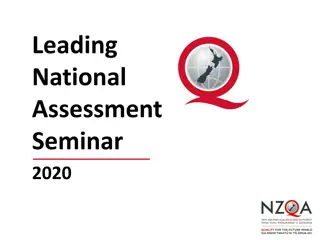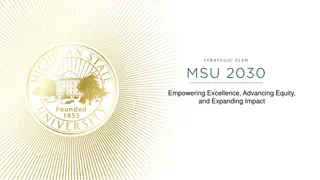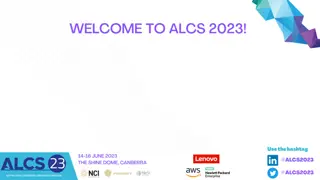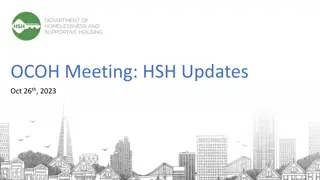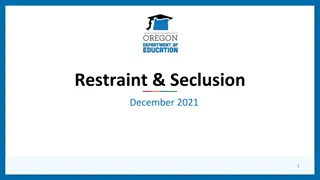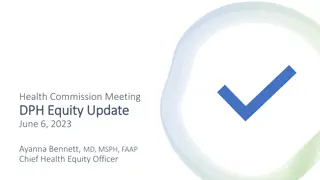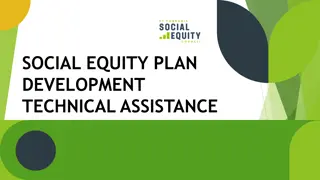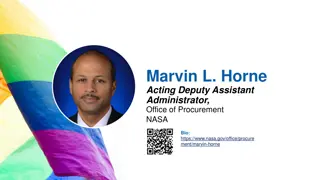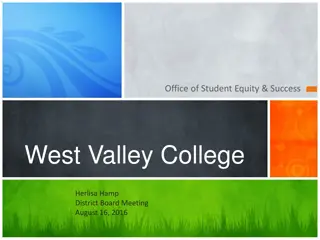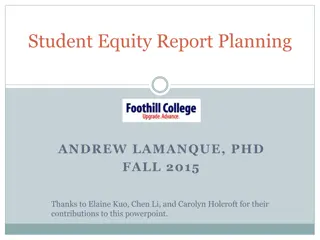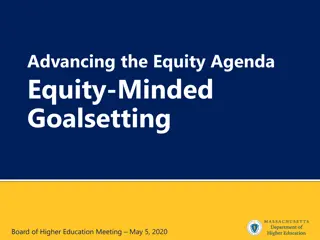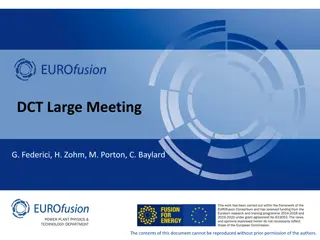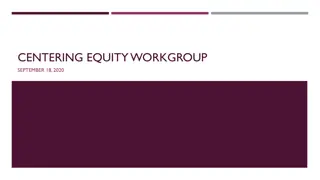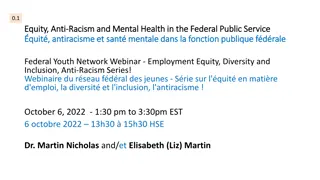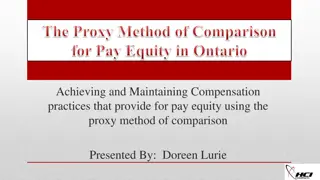
Insights on Black Clients' Experiences in Pierce County Coordinated Entry Services
Explore the challenges faced by Black individuals accessing entry services in Pierce County, highlighting racial inequities and the importance of cultural competency in client-caseworker relationships. Key initiatives and projects aiming for racial equity are also discussed.
Download Presentation

Please find below an Image/Link to download the presentation.
The content on the website is provided AS IS for your information and personal use only. It may not be sold, licensed, or shared on other websites without obtaining consent from the author. If you encounter any issues during the download, it is possible that the publisher has removed the file from their server.
You are allowed to download the files provided on this website for personal or commercial use, subject to the condition that they are used lawfully. All files are the property of their respective owners.
The content on the website is provided AS IS for your information and personal use only. It may not be sold, licensed, or shared on other websites without obtaining consent from the author.
E N D
Presentation Transcript
Understanding Experiences of Black Clients Using Pierce County Coordinated Entry Services Presentation for Pierce County Coalition to End Homelessness June 17, 2022 Carolyn Weisz and Mike Craw
Racial Inequity - SPARC Report (Dones et al., 2018) Although Black people comprise 13% of the general population in the United States and 26% of those living in poverty, they account for more than 40% of the homeless population, suggesting that poverty rates alone do not explain over-representation. Network Impoverishment . . . is not just that the respondents are experiencing poverty; the network itself functions in an impoverished state.
Racial Equity Demonstration Project Workgroup Delmar Algee, Pierce County Department of Human Services/Catholic Community Services John Barbee, Pierce County Department of Human Services Alan Brown, Catholic Community Services Dr. John Casteele, Tacoma Ministerial Alliance Courtney Chandler, Associated Ministries Michael Craw, The Evergreen State College Valorie Crout, Associated Ministries Gerald Daniels, Brotherhood RISE Center Anne Marie Edmunds, Pierce County Department of Human Services Ben Feldbush, Comprehensive Life Resources Dash Jefferson Teona Kelly, Associated Ministries Mary Frances Kenion, U.S. Department of Housing and Urban Development Consultant Valeri Knight, Pierce County Department of Human Services Stacey Matthews, US Department of Housing and Urban Development Consultant Emily Mirra, Building Changes Elder Toney Montgomery, Tacoma Ministerial Alliance Sheila Moreland Hank Noll, Catholic Community Services Dana Orr, Pierce County AIDS Foundation Rebecca Rosado, Tacoma Ministerial Alliance Saydey Spears Linda Stewart, City of Tacoma Michelle Valdez, U.S. Department of Housing and Urban Development Consultant Carolyn Weisz, University of Puget Sound HUD Racial Equity Demo Project 8 CoC s across the U.S. Pierce County Demo Project October 2020 - February 2022 Funding provided by City of Tacoma
CCA-TMA Cultural Hub Model of CE a partnership between a traditional CE organization and a community-based organization at the level of the neighborhood or community that is considered a trusted messenger within the community it serves Modeled from CHiRP partnership between CCS and Tacoma Ministerial Alliance Goal of providing culturally competent community-based services CCS provides TMA with system orientation and support TMA serves clients and shares lessons learned
Client-Caseworker Relationship Trust is essential for gathering information, collaborative decision- making, and ongoing client engagement System navigation can be complex, and failure in one part can lead to distrust and disengagement Cultural competency can help in strengthening understanding, communication, and trust
Interview Study Methods Development of scripts and survey by workgroup Recruitment by AM and Brotherhood Rise Center Black heads of households using CE in the last year Interviews by Rise Center Staff (December-January) Audio-taped interview Background survey Satisfaction ratings (CE and caseworker) Transcription and Coding Drafting and refining report
Participants 16 Black heads of households 14 with children (12 women and 2 men) and 2 women without children 11 currently homeless; 9 homeless three or more times CE agencies 10-12 AM, 4-7 TMA, and 1 or more with CCS CE services 7 Diversion, 2 Priority Pool, 5 indicated both, 1 unsure, 1 neither CE contact ranged from 1-2 conversations to daily/weekly contact over months
Findings - Mixed Overall Satisfaction Satisfaction with Coordinated Entry very or extremely satisfied somewhat satisfied not at all satisfied 4 5 6 Satisfaction with Caseworker(s) very or extremely satisfied somewhat satisfied not at all satisfied 8 3 4 Qualitative Caseworker Themes Mostly or all positive 6 Mostly or all negative 3 Mixed and/or different staff 7
Life Challenges and Race-Related Themes Life Challenges Alongside CE Housing (9+) Parenting, childcare while homeless (7) Financial challenges (5) Health, emotional, financial strain (4) Unfamiliar with Pierce County (2) Race-Related Themes Housing discrimination (7) Systemic and everyday racism (5) Felt CE treatment was non-discriminatory (4) It would help if caseworker was Black (2) Caseworker connected me with Black people (1) Training would be helpful (1)
Positive/Helpful Aspects of CE Housing resources (10 participants total) Housing that came through (4) Housing list (3) Moving costs (4) Place to stay while waiting (1) Case worker connected regularly with landlord (1) Other helpful resources or referrals (6 participants total) Furniture (4) Food (3) Personal hygiene and diapers, employment, school, parenting support, counseling (1 each)
Problems/Negative Aspects of CE Issues of timing (11) Waiting (9); Uncertainty about when/if things will happen (4); Rushed to do things (1) Housing resources (10) Housing option affordability (5); Housing lists not helpful (4+); No temporary housing while waiting (2); Poor quality housing referral (1); Income too high for PP, had to quit job (1); Past eviction (1); Got nothing (1) Complexity and poor understanding of CE (6) Unclear (4); Too complex (3); Too many hoops and tasks (4); Misunderstood (1) Negative emotional toll (6) Frustration, disappointment (4); Invisibility (4); Stress, anxiety (2) Other problems (4) Residency in two counties complicated eligibility for CE (1); 211 rudeness (1); Lack of initial responsiveness (1); Easy to fall through the cracks (1)
Caseworker Positive Themes (11 participants total) Regular, responsive, consistent communication (9) Trustworthy, honest (8) Encouraging, supportive (4) Transparent, clear, direct (3) Multiple communication methods (text, call, email, etc.) (3) Followed through (3) Shared my identity (3) Provided helpful pushing (2) Organized (2) Comfortable; Respectful; Flexible; A friend; Being able to change caseworkers (1 each)
Caseworker Negative Themes (10 participants total) Unresponsive (9) Ineffective (4) Not trustworthy (3) Not enough communication (3) Unreliable, inconsistent (2) Confusing, not clear (2) Didn t follow through when I did my part; Didn t remember me; Had an attitude with me; Said what I wanted to hear; Re-opened trauma (1 each)
Key Findings and Recommendations Caseworker responsiveness and communication matters Support caseworker capacity and flexibility Trust in caseworker and CE system matters Cultural competency, consistency, follow-through Improve housing resources (lists of affordable/available housing) Clients experience CE as complex and uncertain Reduce wait times, clarify timelines, provide online information Minimize numbers of touch points Black clients experience racial discrimination and trauma Expand cultural hub services Assess outcomes using a Targeted Universalism approach More housing is needed - both permanent and temporary
Thank you! Questions and Feedback Welcome! Carolyn Weisz, University of Puget Sound (cweisz@pugetsound.edu) Michael Craw, The Evergreen State College (crawm@evergreen.edu)

